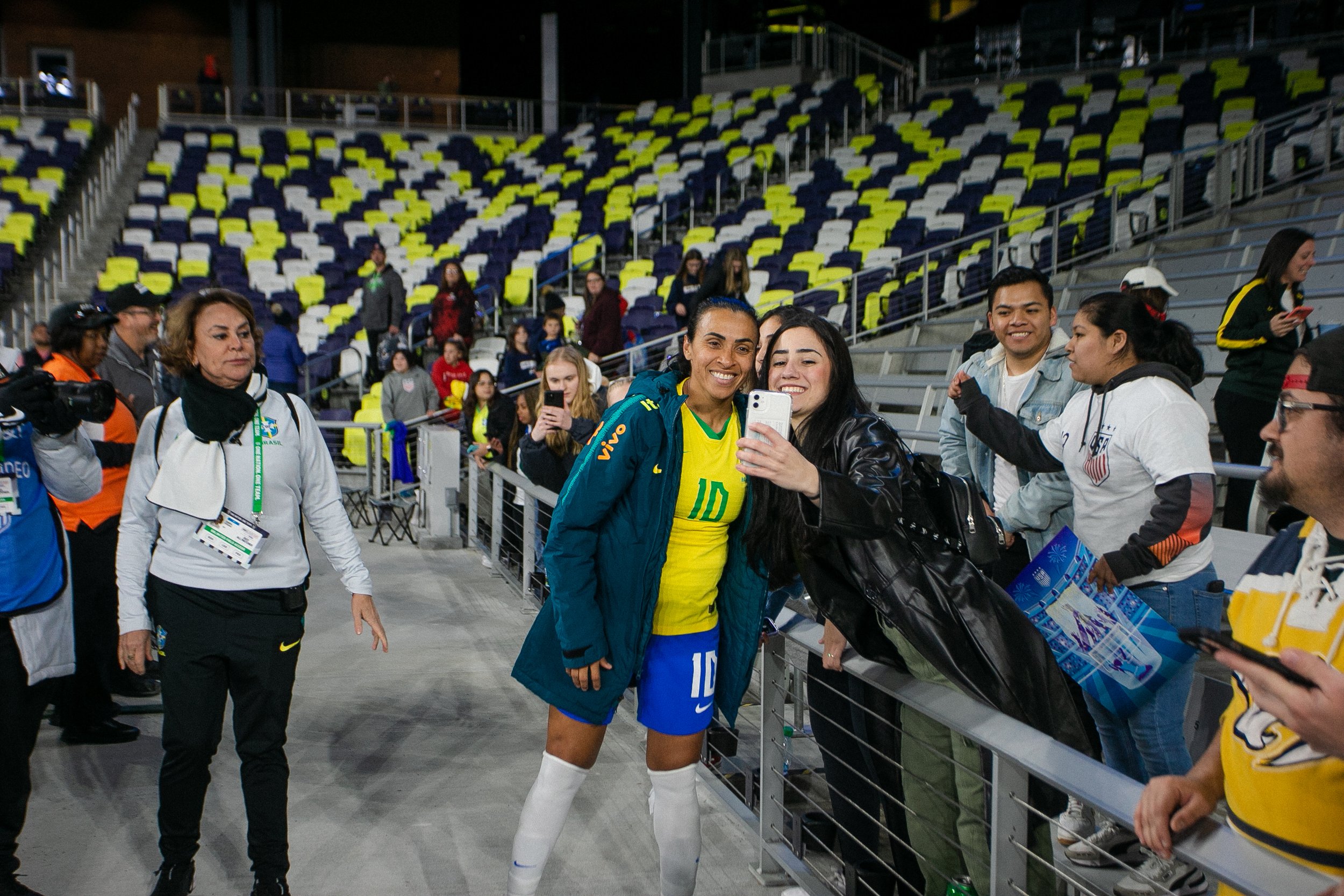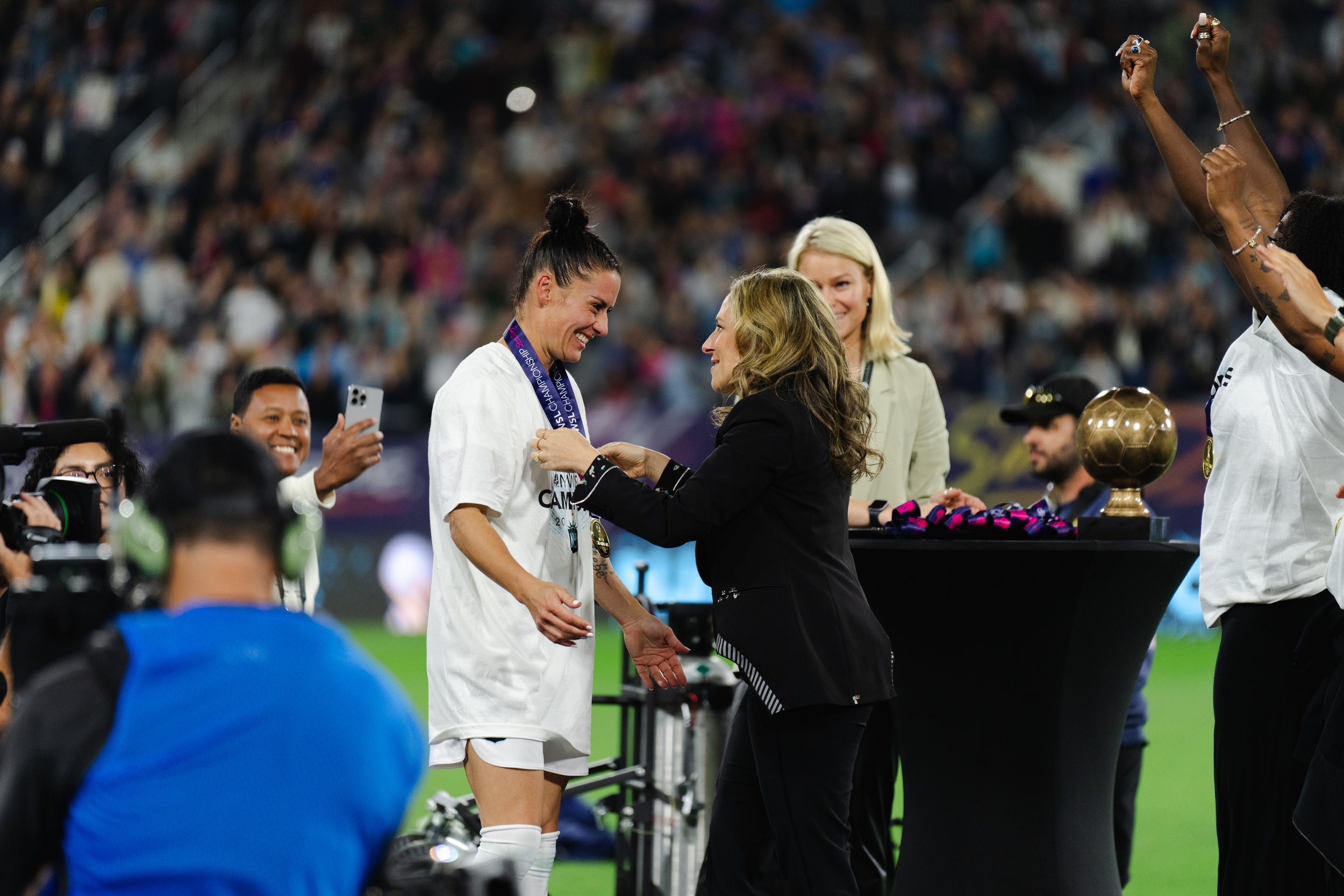The Future of WoSo in Music City

USWNT coach, players and supporters’ groups discuss future of the NWSL in Nashville
The United States Women’s National Team’s 1-0 win over Japan in Sunday’s SheBelieves Cup matchup was the first professional women’s soccer game at Nashville’s nearly year-old GEODIS Park.
If Chrissy Webb and Allison Jacobus get their way, it won’t be the last.
Webb and Jacobus are two founders of the supporters’ group NWSL 2 Nashville. Since 2017, they’ve hosted National Women’s Soccer League watch parties and advocated— via merchandise, word-of-mouth, and social media— for a professional women’s soccer team in the Music City.
This year’s SheBelieves Cup was a taste of what women’s soccer could be in Nashville— for the fans, players and coaches.
“When the SheBelieves Cup comes or another U.S. game comes, you're like, ‘Oh, by the way, you can see all these people weekly [in the NWSL], if you wanted to,” Webb said. “It's just building off of that momentum.”
The NWSL 2 Nashville group is not alone in its thought that Tennessee's most populous city should consider vying for an NWSL expansion team. After the United States’ win, coach Vlatko Andonovski said that he could see the checkered blue, yellow and white seats of GEODIS Park filled for NWSL play.
“It was unbelievable. It was loud,” Andonovski said. “I mean, the support was so obvious… It would be nice to see an NWSL team here. I think that there will be a good stadium, a good environment, and it’s very obvious that Nashville supports soccer.”
The audience in Nashville— more than 25,000 strong— got to witness a 45th-minute breakaway goal from the United States’ Mallory Swanson, with a flick-on assist from Alex Morgan. Two big stops from goalkeeper Casey Murphy shut out Japan, who outshot the United States 15-5 but couldn’t put its chances on frame.
This match was the first that either the U.S. men’s or women’s national team has played at GEODIS Park.
“This stadium is beautiful,” said Murphy. “We had our matchday minus-one practice here yesterday, and so I was thinking about it all night. The grass is perfect, obviously a ton of fans, great atmosphere. It’s the best type of environment to play in, especially with a home crowd.”
Canada beat Brazil 2-0 afterwards, in the back leg of the day’s doubleheader. A significant portion of the crowd left after the United States finished play, but those that remained watched longtime players like Marta and Christine Sinclair take the field.
GEODIS Park, which sits 30,000 and is the largest soccer-specific stadium in the United States, was constructed with the thought that bringing an MLS franchise to Nashville “would increase public exposure to soccer, which could result in an increased interest and participation in women’s soccer, and one day lead to a professional women’s soccer team in Nashville,” says the resolution passed by the Nashville Metro Council in 2017, before stadium construction.
The stadium currently hosts Nashville SC, the city’s Major League Soccer team that played its first season in 2020. In its third season in the league, Nashville was fourth in the MLS in average attendance, behind Atlanta, Charlotte and Seattle.
The United States has previously played SheBelieves Cup games at the Tennessee Titans’ Nissan Stadium in 2016 and 2019— both games leading their respective tournaments in attendance, both scheduled as the cups’ weekend games.
“I think this atmosphere was the best we’ve had in a long time,” said U.S. forward Megan Rapinoe. “Obviously, the fans are amazing here. And that’s great for us. That hypes us up and keeps everybody engaged and brings the level of our game, I think, up to another level, and Nashville is always a great place to come.”
Rapinoe arrived at Sunday's game wearing a cowboy hat from the local Rustler Hat Co., along with her team-issued warm-up gear.
“A little tip of the hat to Nashville,” Rapinoe said. “I thought I’d do something, coming into Dolly Parton, 9-5— felt right considering all the equal pay protests that are going on.”
It helps that Nashville is a “destination city” beyond sports, said Jacobus, with bars and live music within walking distance or a short drive from many of the athletic stadiums and arenas in the city.
“Everybody wants to come to Nashville,” said Andrea Kraft, who has lived in Nashville for 11 years and been a member of the American Outlaw supporters’ group for nearly a decade. “Everybody is here for a bachelorette party and everything else, so why not throw in a soccer game? We have some friends coming from England later this year, and they actually planned their trip so they could come to a Nashville [SC] game.”
Jacobus also pointed out that Nashville is used to rallying around new sports teams. Nashville’s other sports teams are relatively new, compared to the leagues they compete in. The NFL’s Tennessee Titans relocated to Nashville in 1997, and the NHL’s Nashville Predators began play shortly after, in 1998. The Predators have recently posted attendance figures averaging above the capacity of Bridgestone Arena.
“Nashville shows up for the community,” Jacobus said. “And I think if you build it, they will come. And I think that we've seen it time and time again with sports here.”
Webb and Jacobus, who met through American Outlaws, have worked with what Webb says is a “core group of between five and 10 people that are boots on the ground” to spread the excitement for women’s soccer in their city. The group’s T-shirts, drink koozies and hoodies combine a record turntable with a soccer ball and read “NWSLville.” The supporters have banners, magnets, and business cards, said Webb, and simply wearing a USWNT jersey out to eat once struck up a conversation with a stranger that ended in an additional follow for the group’s social media pages.
In 2019, the group organized FIFA Women’s World Cup watch parties, packing people into a local bar for early-morning kickoffs in France.
“There was no moving,” said Webb. “We just kind of rotated.”
They’ve also organized NWSL regular-season watch parties at The Lost Paddy pub— for the upcoming season, too. Many Nashville women’s soccer fans have taken to supporting nearby teams— Louisville is two-and-a-half hours away, Chicago seven, North Carolina ten— or picking a team based on favorite players or playing styles.
“Alex Morgan is my favorite,” said Kraft. “We tend to watch more of wherever she is.”
In January, the NWSL announced that the 12-team league would welcome Utah, San Francisco and Boston for the 2024 season, with San Francisco and Boston paying record expansion fees of $50 million. So, if Nashville ownership groups were to bid for a team, it would be several years— and millions of dollars— until an expansion plan is formalized.
“I'm okay with Dolly Parton investing,” said Webb. “Taylor [Swift]— I can work with either one of them.”
In reality, Webb acknowledges that, for the NWSL 2 Nashville group, it’s not just about investment and ownership— It’s about getting the right people as owners, ones that will treat players with dignity and respect, especially in light of recent discussions around player safety and treatment in the league. There’s also rightful consideration into states’ legislation regarding reproductive rights and its implications for expansion for a women’s sports league.
Ahead of the 2024 expansion city selections, reporting from Grant Wahl named Atlanta, Austin, Toronto, Cincinnati and Columbus as other cities eyeing expansion, alongside USL W-League team Minnesota Aurora FC and a group in Cleveland. According to The Athletic, NWSL sources noted Nashville and Phoenix as cities with ownership groups expressing “some level of interest,” though Nashville did not emerge as an active frontrunner come time to submit official bids.
That’s not to say there isn’t a level of interest in Nashville’s residents. A recent report from CAAIcon Strategic Advisory found over 60 percent of 4400 surveyed and 41 focus-group participants expressed “moderate to strong” interest in a professional women’s sports team in the city.
In the meantime, Webb and Jacobus will continue advocating for Nashville SC’s ownership to keep an eye on the NWSL expansion market.
“I've had the privilege of running into [Nashville SC ownership] once or twice and just casually like, ‘Hey, how are things going?’” Webb said. “One of my personal goals is reaching out and making sure that people know that there is a group that actually cares about this.”
There’s also no lack of women’s soccer in the state of Tennessee, as-is. The Nashville Rhythm, the city’s amateur Women’s Premier Soccer League team, won the Southeast Conference in 2022 and was one of the most offensively dominant squads out of the league’s 120-plus teams. In college soccer, the University of Tennessee won the SEC tournament in 2021, and before them, Vanderbilt University in 2020. NWSL draftees, Jamaican National Team player Kameron Simmonds and United States Beach Female Player of the Year Ali Hall all play college soccer in the Volunteer State.
But whether women’s soccer will become a staple at GEODIS Park— that will be a question asked as the NWSL looks to expand further. Alex Morgan said that she could see it happen.
“Playing in a soccer-specific stadium is the best-case scenario, having 25,000 [in attendance] like this where the crowd is energetic is fun,” Morgan said. “The pitch is perfect. It was actually a great game for us. So hopefully there is more NWSL teams, and Nashville would be a great candidate for that.”
The excitement around the upcoming 2023 Women’s World Cup in Australia is a good chance to spread enthusiasm for women’s soccer in Nashville, too. More watch parties may be in the works for NWSLville.
“We came off [the 2019] World Cup right into the pandemic,” Webb said. “We didn't get to see what could have happened. [This year], we'll figure out what the benefits are, coming out of all of this, going forward. It's getting the connection of, ‘Wow, these people play in your country.’”
Photography by: Dave Williamson.










